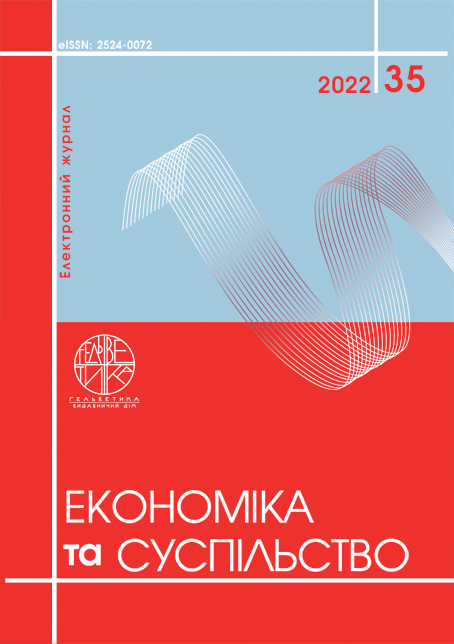REFRACTION OF MICROECONOMIC, MACROECONOMIC AND INTERNATIONAL ASPECTS IN INNOVATIVE STRATEGIES OF ECONOMIC ACTIVITIES IN THE CONTEXT OF W. SHAKESPEARE'S WORKS
Abstract
The article provides a study of the features of refraction in the works of William Shakespeare microeconomic, macroeconomic and international aspects of economic activity. The article analyzes the specifics of the socio-economic background of William Shakespeare's formation as an artist and personality, the role of the plague pandemic and post-pandemic complications in the metamorphoses of economic and social life of the High Middle Ages is determined. The causal links between catastrophic imbalances in the production chain between production and consumption caused by the rapid reduction in the number of producers in the face of epidemic challenges and the cascade of forced radical technological and social-economic innovations in High and Late Middle Ages have been proven. The principles and specifics of the implementation of innovative development strategies, which are spreading in Europe at the turn of the Middle Ages and Modern times, are revealed. The negative, restraining influence on the implementation of innovative strategies in the new socio-economic conditions of the dominant associations of craftsmen in the national markets, which formed shops with strict regulation of the statutes of the spheres of activity, number of participants and features of the technological process. The impact of such restrictions and subsequent changes on the economic activities of William Shakespeare and his contemporaries is shown. The article provides a need to weaken the role of merchant guilds and craft shops as a guarantee of access to a steady upward trajectory of economic growth. The reasons and peculiarities of the transformations of international logistics chains are shown, in particular, after the loss of factors in Constantinople in the fierce Genoese-Venetian struggle and in the Venetian-Turkey confrontation over the maintenance of trade outposts in the Southern and Eastern Mediterranean. An analysis of the impact on the activities of Mediterranean negotiators of trade beyond the regional framework and its acquisition of a global character, the modality of reflection and interpretation of changes in international economic activity in the works of the English poet William Shakespeare.
References
Юнг Э. Мысли Юнга объ оригинальномъ сочиненіи. Санкт-Петербург, 1812. 100 с. URL: https://books.google.ru/books?id=AB5oAAAAcAAJ (дата звернення: 11.11.2021).
Брандес Г. Шекспир. Жизнь и произведения. Москва, 1997. 734 с.
Gogela A. M. Economic Conflict and Collusion in Shakespeare’s Merchant of Venice. Journal X. 1999. Vol. 4. P. 21–39.
Ward C. B. The Value of Commerce in The Merchant of Venice. URL: http://scholarship.claremont.edu/cmc_theses/1278 (дата звернення: 11.12.2021).
Parmet J. R. Shylock’s Demon And The Ideology of Capitalism. URL: https://scholar.colorado.edu/concern/graduate_thesis_or_dissertations/6969z1117 (дата звернення: 14.12.2021).
Ruebl J. The Merchant of Venice and the Economics of Risk and Investment. URL: https://static1.squarespace.com/static/58d6cdd81b10e366b420cb80/t/59605cc12e69cf41515c38e2/1499487425439/The+Merchant+of+Venice.pdf (дата звернення: 29.12.2021).
Ле Гофф Ж. Средневековый мир воображаемого: пер. с франц. Москва, 2001. 440 с.
Шекспір В. Ромео і Джульєтта / Твори в шести томах. Київ, 1986. Т. 2. С. 311–413.
Історія економічних вчень / В.В. Білоцерківець, В.В. Волошенюк, О.О. Завгородня та ін. Київ, 2016. 376 с.
Шекспір В. Отелло, венеціанський мавр / Твори в шести томах. Київ, 1986. Т. 5. С. 119–234.
Шекспір В. Венеціанський купець / Твори в шести томах. Київ, 1986. Т. 2. С. 477–570, 611–618.
Tassini G., Sadoulet L. Lessons from the Merchants of Venice, Knowledge. 2017. June 28. URL: https://knowledge.insead.edu/blog/insead-blog/lessons-from-the-merchants-of-venice-6501 (дата звернення: 02.12.2021).
Акройд П. Шекспир. Биография. Москва, 2010. 734 с.
Yunh, E. (1812). Mysly Yunha ob oryhynalnom sochyneniy [Jung's thoughts on the original composition]. Saint Petersburg. Available at: https://books.google.ru/books?id=AB5oAAAAcAAJ (accessed 11 November 2021).
Brandes, G. (1997). Shekspyr. Zhyzn y proyzvedenyia [Shakespeare. Life and works]. Moscow. (in Russian)
Gogela A. M. (1999). Economic Conflict and Collusion in Shakespeare’s Merchant of Venice. Journal X, 4. 21–39.
Ward, C. B. The Value of Commerce in The Merchant of Venice. Available at: http://scholarship.claremont.edu/cmc_theses/1278 (accessed 11 December 2021).
Parmet, J. R. Shylock’s Demon and the Ideology of Capitalism. Available at: https://scholar.colorado.edu/concern/graduate_thesis_or_dissertations/6969z1117 (accessed 14 December 2021).
Ruebl, J. The Merchant of Venice and the Economics of Risk and Investment. Available at: https://static1.squarespace.com/static/58d6cdd81b10e366b420cb80/t /59605cc12e69cf41515c38e2/1499487425439/The+Merchant+of+Venice.pdf (accessed 29 December 2021).
Le Goff, J. (2001). Srednevekovyi myr voobrazhaemoho [The medieval world of the imaginary]. Moscow. (in Russian)
Shakespeare, W. (1986). Romeo i Dzhulietta [Romeo and Juliet]. Tvory – Works (Vols. 1–6). (Vol. 2, pp 311–413). Kyiv. (in Ukrainian)
Bilotserkivets, V.V, Volosheniuk, V.V., Zavhorodnia, O.O. etc. (2016). Istoriia ekonomichnykh vchen [History of economic thought]. Kyiv. (in Ukrainian)
Shakespeare, W. (1986). Otello, venetsianskyi mavr [The Tragedy of Othello, the Moor of Venice]. Tvory – Works (Vols. 1–6). (Vol. 5, pp 119–234). Kyiv. (in Ukrainian)
Shakespeare, W. (1986). Venetsianskyi kupets [The Merchant of Venice]. Tvory – Works (Vols. 1–6). (Vol. 2, pp 477–570). Kyiv. (in Ukrainian)
Tassini, G., Sadoulet, L. (2017). Lessons from the Merchants of Venice, Knowledge. Available at: https://knowledge.insead.edu/blog/insead-blog/lessons-from-the-merchants-of-venice-6501 (accessed 02 December 2021).
Ackroyd, P. (2010). Shekspyr. Byohrafyia [Shakespeare. Biography]. Mosow. [in Russian].


